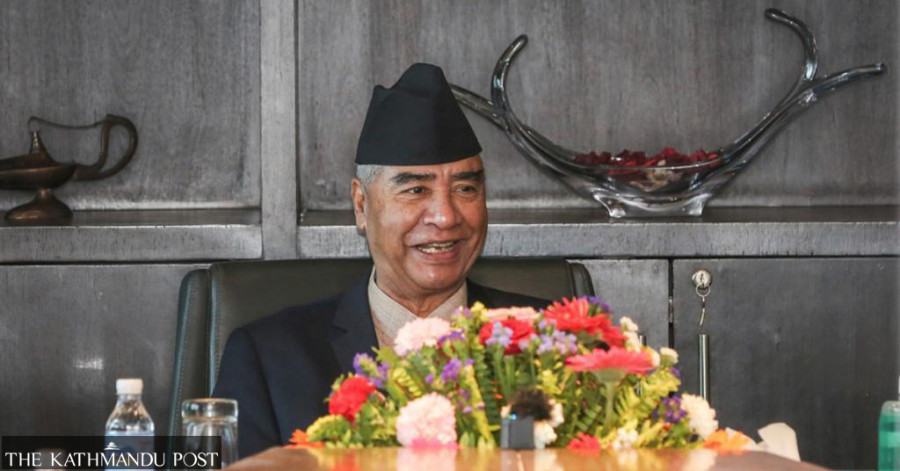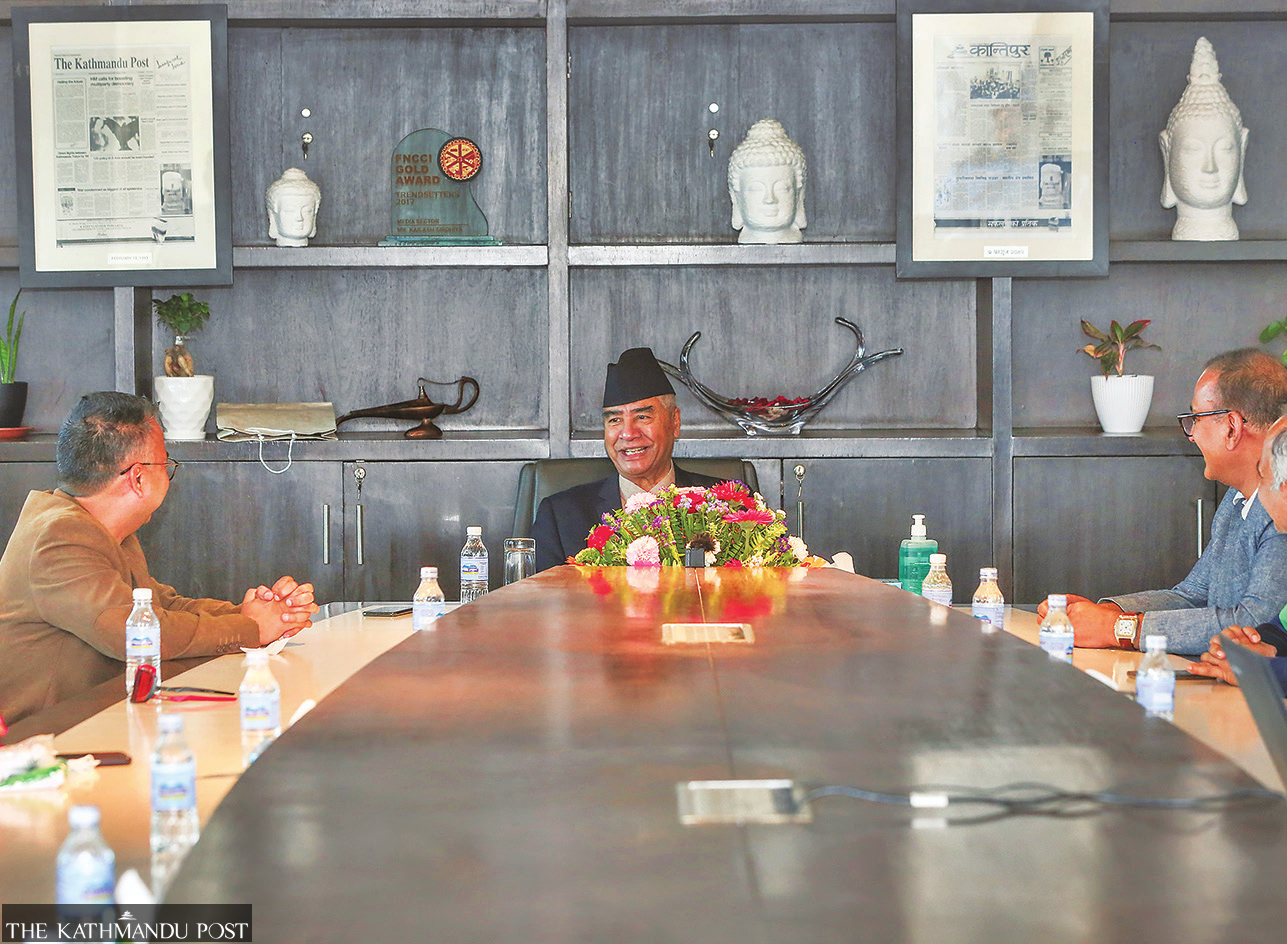National
Buoyed by success of local polls, Deuba for holding elections by end of November
Encouraged from local polls, the premier holds confidence in the coalition despite some concerns shown by partners.
Anil Giri
Amid speculation that national and provincial elections could be delayed, Prime Minister Sher Bahadur Deuba said on Saturday that elections would be held by the end of November.
“We are holding discussions [within the ruling coalition]. Elections will be held within November,” said Deuba during a brief interaction with the Post and its sister paper Kantipur after inaugurating the 10th edition of Kantipur Half Marathon on Saturday morning.
Deuba appeared concerned about possible criticism if elections are delayed.
“There will be controversy if elections are pushed back,” said Deuba. “You [the media] will also criticise if the polls are delayed.”
The prime minister’s assertion comes at a time when some ruling party leaders are airing views that elections could be pushed to February next year.
Encouraged by the results of the May 13 local elections—which catapulted the Nepali Congress into the first position, Deuba seems to be preparing to hold the general elections at the earliest possible as he wants to strike when the iron is hot.
The CPN (Maoist Centre), Deuba’s key coalition partner, has gained bargaining power by emerging as the third and decisive force and prospects of it siding with the CPN-UML are low. The CPN (Unified Socialist)’s election results are not great but it’s not easy for the party to shake hands with the UML, the party that it split from following months of bitter relations with KP Sharma Oli who then led the unified communist force.
Deuba, hence, appears to take advantage of the situation.
The Janata Samajbadi Party, which has emerged as the fourth largest party from the May polls, is unlikely to walk out of the coalition, while the fifth and the smallest constituent, Rastriya Janamorcha, will leave little impact whether it remains in the coalition or deserts it.
Observers say the earlier the elections are held, the better it is for Deuba’s Congress party.
But to hold elections by the date the prime minister wants, he needs to take his coalition partners into confidence.
And he seems to be well aware of the difficulty of leading a coalition, which came into being last year following then-prime minister Oli’s shenanigans and unconstitutional moves, including dissolution of the House.
“Of course it is difficult to run a coalition,” he said. “Running a party itself is difficult; running a coalition then has some obvious challenges.”
He, however, expressed confidence that the coalition would not face any problems that are unresolvable.
After facing a loss at the local elections, the UML has been in a bid to break the coalition.
In a bid to preempt any such attempt by the main opposition, Deuba has expedited consultations within and outside the coalition for the general elections.
On Saturday, Deuba met with the chairman of the Loktantrik Samajbadi Party, Mahantha Thakur, and discussed the upcoming general and provincial elections.
According to Keshav Jha, a Loktantrik Samajbadi leader, the prime minister wanted to solicit the party’s views [on election dates] and the possibility of the party coming into the current coalition’s fold.
Before the formation of the Loktantrik Samajbadi, in August last year, the Thakur faction of the Janata Samajbadi Party had sided with Oli. In the local elections, the Loktatrik Samajbadi Party forged an electoral alliance with the UML in some places. The move, however, did not help the party much.
Deuba on Saturday also sent Home Minister Bal Krishna Khand to meet with Maoist Centre chair Pushpa Kamal Dahal. According to a statement issued by the latter’s private secretariat, the leaders discussed poll dates, the continuation of the alliance, and promotions in the Nepal Police, among other issues.
Deuba’s major concern is a possible left alliance. In 2017, when the UML and the Maoist Centre fought under the left alliance, they jointly swept the elections, leaving the Congress far behind in one of the most spectacular defeats the party had ever faced.
Congress insiders say holding elections at the earliest date possible will be in the larger interest of the party.
Some Maoist Centre and Unified Socialist leaders have been saying lately that since local elections were just concluded and they need to sort out some internal issues, they need some time to discuss general election dates.
With the Maoist Centre emerging as the kingmaker and the Unified Socialist, which was formed last August after splitting from the UML, failing in local poll performance, their leaders have their own views on dates for general and provincial elections.
One crucial issue is seat-sharing.
Of the total 165 constituencies under the direct election system up for grabs, the two communist forces want to extract as many as possible from the Congress.
The Congress, however, may not be able to set aside more than 65 seats—or 40 percent—for the coalition partners.
The way Maoist chair Dahal has started to publicly warn the Congress gives a sense that he wants 40 percent of the seats for his party alone.
“The earlier the elections, the better for us,” said a Congress office bearer. “If we hold the elections on time, it will strengthen the alliance and reduce the chances of a left unity.”
According to the Congress office bearer, Deuba wants to hold elections by the end of November.
During his interaction with the Post and Kantipur, Deuba said that the purpose for which the coalition was built is yet to be fulfilled.

“There may be some issues within the coalition but they are manageable,” said Deuba. “Ahead of the local elections, there was a dispute inside the Congress whether to forge an electoral alliance among the ruling parties but now that confusion is over.”
Political observers say it is understandable that parties in a coalition government look for a comfortable time to hold the elections.
“Polls should be held on time as periodic elections are the backbone of democracy,” said former Speaker Daman Nath Dhungana. “The partners in the coalition may have different views on the dates, which is natural as they calculate their prospects. But as of now, chances of the current coalition breaking down are slim.”
According to Dhungana, the results of the local elections have given the Maoist Centre and others a renewed vitality—a reason why they are unlikely to leave the coalition.
“If they leave, that may sound a bit impractical and it will also invite instability ahead of the elections,” Dhungana told the Post. “That’s why the Nepali Congress and the Maoist Centre should stay together… and ensure the elections and justify the objectives of forging the alliance.”
Since general elections were held in 2017 on November 26 and December 7, the November-end plan for next elections makes perfect sense. There, however, is no clarity on when the term of the current House of Representatives ends.
Those saying elections can be pushed back are arguing that since the first meeting of the House was convened on March 5, 2018, elections can be held in February also.
But Deuba does not seem to be in a mood to take that risk, as it would mean at least six months—an ample time for the UML to play spoilsport.
Congress insiders say given Dahal’s unstable nature, such a huge gap could spell disaster for the Congress. Though Dahal has committed himself to the current coalition, he has been saying that he has been receiving offers to become prime minister.
And since Deuba is already under fire from the UML over a host of issues, including his government’s foreign policy, he appears to be in a mood to get done with the general elections as early as possible.
After the passage of the Millennium Challenge Corporation, Deuba is facing charges that he is tilting towards the United States. UML chair Oli recently took the government to task for allowing a visiting US official to meet with some Tibetan refugee leaders in Kathmandu.
During Saturday’s interaction, Deuba tried to make it clear that his government’s foreign policy has been balanced.
“There has been no change in Nepal's foreign policy or its policy towards China,” said Deuba, while recalling his 2005 decision to close down the office of a pro-Tibetan organisation in Kathmandu.
“We have continued to stick to the one-China policy,” added Deuba. “By the way, I have done something that no one dared to do. I was the one who shut down the Dalai Lama's office [in Kathmandu]. Which other prime minister did that—were they not in the position? Hence, Nepal is clear about its relations with China. Nepal's land will not be used against China under any circumstances.”
This assertion from him also comes just ahead of his scheduled visit to Washington, on the heels of Beijing’s growing concerns over Washington’s renewed interest in Nepal ever since Kathmandu ratified the $500 million US grant. He is set to travel to the United States next month.
China has looked askance at Nepal’s decision to accept the American grant, expressing objections at least twice.
On relations with the south, Deuba said Nepal-India ties are on an upward trajectory. On his US visit, he said, “That’s a bit far,” and that he does not have much to share “at this point of time”.




 8.22°C Kathmandu
8.22°C Kathmandu














